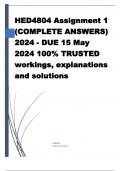HED4804 Assignment 1
(COMPLETE ANSWERS)
2024 - DUE 15 May
2024 100% TRUSTED
workings, explanations
and solutions
ADMIN
[COMPANY NAME]
, Develop a glossary of any 5 key terms in philosophy of education in which you
critically engage with and give an in-depth analysis of these terms. Your
glossary compilation will have to also engage in a thoughtful exploration of the
nuanced meanings and implications associated with each term you have
identified, and it also must relate the relevance of the concepts/key ideas to
education in (South) Africa. Structure/Guidelines: • Select at least five terms
for analysis. For each term, explore its historical context, philosophical origins,
and primary proponents. Choose from the following list of words:
decolonialisation pluriversity hermeneutics emancipation epistemologies
social justice neoliberalism hegemony knowledge identities Ubuntu equality
Africanisation Modernity epistemic violence ontology
Certainly, let's delve into a glossary of key terms in the philosophy of education with a focus on
their relevance to education in (South) Africa:
1. Decolonization:
• Historical Context: Decolonization in the context of education refers to the process of
undoing the legacy of colonialism in knowledge production, curriculum, and educational
systems. In South Africa, decolonization is particularly salient due to the country's
history of apartheid and colonialism.
• Philosophical Origins: The concept of decolonization draws from postcolonial theory,
critical theory, and indigenous knowledge systems. Scholars like Frantz Fanon, Ngũgĩ wa
Thiong'o, and Paulo Freire have contributed to its development.
• Primary Proponents: In South Africa, scholars such as Steve Biko, Mamphela
Ramphele, and Achille Mbembe have advocated for decolonizing education.
• Analysis: Decolonization challenges the Eurocentric bias in education, advocating for the
inclusion of diverse perspectives and knowledge systems, particularly indigenous African
knowledge. It aims to empower learners by recognizing their cultural identities and
histories, thereby fostering a more inclusive and equitable educational environment.
2. Social Justice:
• Historical Context: Social justice in education entails ensuring equitable access to
educational opportunities, resources, and outcomes for all individuals, regardless of
socio-economic background, race, or other identities. In South Africa, issues of social
justice are closely tied to the legacy of apartheid and ongoing economic inequalities.
• Philosophical Origins: The concept of social justice is rooted in theories of distributive
justice, equality, and human rights. Philosophers like John Rawls, Amartya Sen, and bell
hooks have contributed to its development.




